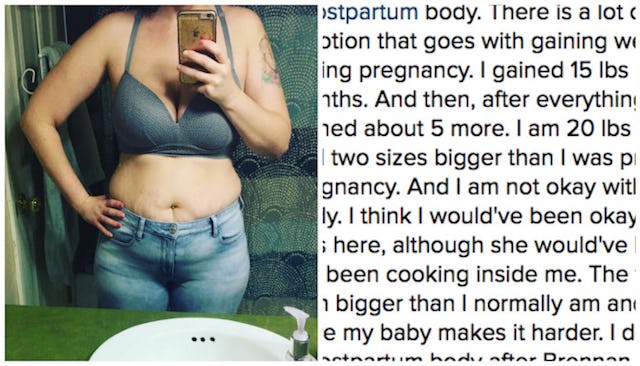Mom Writes About The Post-Baby Body We Don’t Talk About

“I wasn’t prepared to have this body with no baby.”
It’s a trend these days for moms, celebrities and otherwise, to post photos of their honest postpartum bodies on social media. One thing we don’t hear much about is what it’s like to have a postpartum body — but no baby.
Jessica McCoy knows that heartbreaking experience well, and shared a photo of her body after child loss in hopes that it would bring comfort to other moms going through similar situations.
Like many moms, McCoy posted a photo of her postpartum body on Instagram. The difference between her and other moms sharing postpartum pics is that she’s missing her baby girl.
https://www.instagram.com/p/BRdZq4dlTJZ/?taken-by=habe_mccoy
“I am 20 pounds heavier and two sizes bigger than I was pre-pregnancy. And I am not okay with my body,” she wrote. “I think I would’ve been okay if Evie was here, although she would’ve likely still been cooking inside me.”
In the photo, McCoy is a little over two months postpartum and dealing with the usual haywire hormones and softened body, but without a baby to hold.
“Every day I get clothes on and they’re tight. And every day I’m reminded that I grew my baby for six months and she died. It really is a constant reminder to me,” she wrote. “I don’t have love for my body. I am angry at it right now. I can’t be body positive right now. It’s too hard and it hurts too much.”
It’s a rare thing to discuss, but it’s a topic that certainly deserves attention, because pregnancy loss isn’t all that rare. It’s estimated that one in three women will experience a miscarriage and one percent of pregnancies in the U.S. end in stillbirth. Additionally, there are medically elected terminations performed because the health of the mother is at risk or the baby has severe health problems not compatible with life. The women who experience pregnancy loss in any of these ways are grieving. Beyond their profound sadness, they’re also navigating an existence that’s still so stigmatized.
“I’ve never seen anyone post about how they’re upset with their postpartum body because they don’t have a baby to hold,” McCoy told Scary Mommy. “Lots of people are sad that they’re bigger, but it’s very different when you don’t have a baby in tow.”
Image via Jessica McCoy
“Miscarriage and pregnancy loss in our culture remains a taboo topic and therefore many of the elements of the grieving process get overlooked. One of those includes the postpartum body,” Dr. Jessica Zucker, PhD and creator of the #IHadAMiscarriage campaign says. “It’s befuddling how much we ignore the intensity of this experience.”
Because it’s not often talked about, there really isn’t a road map for mothers who go through it. They essentially don’t have the support they need to grapple with all the hormones and emotions surrounding the loss.
“I wasn’t prepared to have this body with no baby,” said McCoy. “I was looking forward to having the baby and slowly working out and getting back to my normal size.”
McCoy started showing around 11 or 12 weeks. She has a son, Brennan, and was really excited about having a girl this time around.
Image via Jessica McCoy
Early on, McCoy said she could feel that something wasn’t right. In the early part of her pregnancy she had some painful cramping and bleeding. At around 18 weeks, she found out that her baby had spina bifida. She was then evaluated to see if she’d be a candidate for fetal surgery. During the evaluation, doctors performed an amniocentesis and this time, the results that came back weren’t encouraging.
“I got a call while I was at work from the genetic counselor that the baby had 22 Q deletion,” Jessica explained. “A whole host of things can be wrong and coupled with spina bifida, it’s even more severe.”
As a result, their baby would likely be in a lot of pain and have to be cared for intensely 24 hours a day, seven days a week, for the rest of her life.
“We decided this was the most loving thing to do as a mom, because I never wanted her to suffer,” she says.
Jessica had a late-term abortion at 23 weeks and five days. She and her husband had to drive three hours away to have it done as the state she lives in has restrictive laws on abortion. The healing process was hard, both emotionally and physically. She described what she went through with this pregnancy as traumatic, requiring therapy. She credits her husband for being a supportive force in her life.
“I don’t like looking in the mirror at myself,” Jessica admitted. “My husband is kind to me, and he’s always been incredibly attracted to me no matter my size, which is really nice.”
She added, “I wish that I could be kind to myself too.”
Sharing her experience and emotions surrounding her postpartum body with no baby on social media was like her own personal therapy too.
“I know every day is a struggle, but I think that it’s important to recognize that and share it. I think it’s important to share your experiences,” she said.
Another part of her healing process will be to honor the life of her baby girl, who she named Evelyn Louise (they were going to call her “Evie”). Jessica made breast milk jewelry with the milk that came in postpartum. She and her husband also plan on getting tattoos of Evie’s footprints, and the whole family will be planting an elm tree (Evie’s initials were E.L.M.) as a way to remember her.
Image via Jessica McCoy
To other moms going through this heartbreaking experience, McCoy’s advice is simple.
“Just give yourself forgiveness and grace.”
(H/T Dr. Jessica Zucker, Ph.D specializing in women’s reproductive and maternal mental health. Creator of the #IHadAMiscarriage campaign)
This article was originally published on